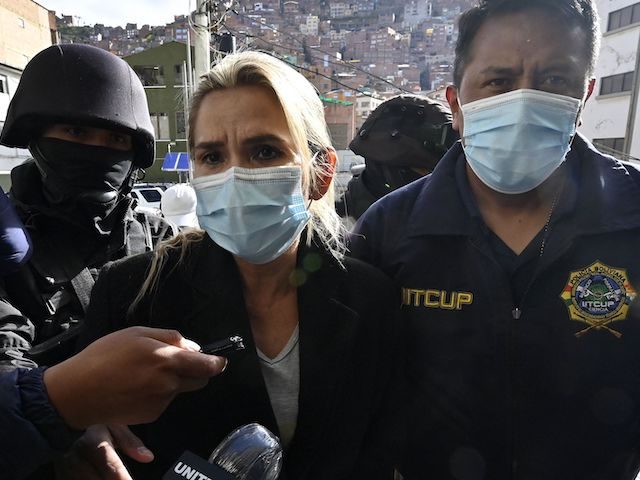Bolivian police arrested former President Jeanine Áñez this weekend – and ordered her to serve four months in prison on Sunday – following accusations by the ruling socialist government of unspecified charges of “terrorism” following the resignation of socialist President Evo Morales.
Morales voluntarily left the presidency in November 2019 after nearly 14 years in power. He ran in the country’s October presidential elections despite being constitutionally term-limited after winning a lawsuit in which he claimed term limits violated his human rights. Morales “won” the election after several technical irregularities resulted in a dramatic shift of votes away from centrist candidate Carlos Mesa and for Morales.
The Organization of American States (OAS) published a preliminary study finding significant evidence of fraud in that presidential election, prompting Morales to resign.
Morales and most senior members of his government – members of the Movement Towards Socialism (MAS) party – fled the country following his resignation. Using the Bolivian constitution’s designated line of succession, authorities determined the Áñez, a conservative senator, was the highest-ranked person left in the country to become interim president.
As president, Áñez’s mandate was to organize free and fair elections as soon as possible. Áñez organized successful elections for October 2020 in which she did not participate. MAS candidate Luis Arce won the election, paving the way for Morales to return from self-imposed exile in Argentina. Arce’s administration dropped charges of terrorism, crimes against humanity, and pedophilia imposed on Morales during Áñez’s administration stemming from Morales’ threats to organize violent attacks on her administration and the discovery of a birth certificate of a child born to Morales and a minor.
Añez is facing charges of terrorism, sedition, and conspiracy, the court processing her case revealed this weekend, in response to her accepting the title of interim president following Morales’s voluntary departure. The judge presiding over the case ruled Áñez is enough of a flight risk to merit four months of pre-trial imprisonment. The charges appear to be a downgrade from initial threats of charges of “genocide” against her by socialist leaders.
Bolivia’s Minister of Justice and Transparency Iván Lima announced the state is seeking to imprison Áñez for 30 years if found guilty.
“What we are seeking is not four months of detention, what we are seeking is a 30-year sentence, because there have been bloody massacres, mothers who have been left without children,” Lima asserted.
Violent incidents did occur in the aftermath of Morales’ resignation, organized and prompted by MAS forces. Socialist groups flooded cities chanting calls for civil war and attacking local facilities. Bolivian authorities obtained audio police claimed to be of Morales himself orchestrating violence from abroad by asking supporters to blockade roads and not “let food into the cities” to starve urban populations into demanding his return to power. Morales also publicly called for the creation of “people’s armed militias” to attack the Áñez government.
Pro-MAS prosecutors are accusing Áñez of being the face of a “coup” with military and police support to depose Morales, citing comments by Williams Kalimán, the head of the Bolivian Armed Forces, suggesting Morales resign given the evidence that he tampered with the results of the presidential election. As Áñez also supported Morales’ resignation, the prosecutors are accusing her of participating in the alleged “coup.”
Local media reported that prosecutors are calling Luis Fernando Camacho – a conservative presidential candidate who ran in the 2020 election – of being the “mastermind” of Áñez’s ascent to the presidency. Prosecutors reportedly do not have evidence of any collusion between Camacho and the MAS leaders who fled the country and left Áñez at the front of the line of succession.
In letters posted to her Twitter account, Áñez is calling for the international community to intervene, specifically requesting the OAS and the European Union send observers to Bolivia to monitor her trial. Áñez referred to her trial as “aberrant political persecution” and urged independent observers to “evaluate in an objective and impartial manner the illegal apprehension that we have been victims of.”
In a personal message posted to her account, Áñez urged Bolivians to “have faith and hope” in the coming months.
“As we have denounced, MAS decides and the judicial system obeys: they are sending me to four months in detention to wait on a trial for a ‘coup’ that never happened,” Áñez wrote. “From here I call on Bolivia to have faith and hope. One day, between us all, we will lift up a better Bolivia.”
Alaín de Canedo, Áñez’s attorney, further commented to the press that prosecutors’ focus on statements from military leaders omits the pronounced presence of several major institutions in the transition process after Morales’ voluntary resignation, including the Catholic Church and the United Nations. These entities participated in the transition in peacekeeper capacities, as well as the OAS, and as of now have not made any prominent appearances in the prosecution’s case.

COMMENTS
Please let us know if you're having issues with commenting.